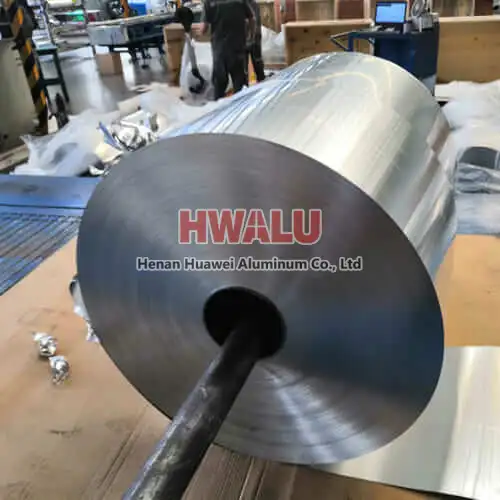Advantages and main applications of aluminum foil food packaging Aluminum foil food packaging is beautiful, lightweight, easy to process, and easy to recycle; aluminum foil packaging is safe, hygienic, and helps maintain the aroma of food. It can keep food fresh for a long time and provide protection from light, ultraviolet rays, grease, water vapor, oxygen and microorganisms. In addition, please be aware of th ...
Introduction Of Best Price Aluminium Foil Roll 3003 Aluminium foil roll 3003 is a common product of Al-Mn series alloys. Because of the addition of alloy Mn element, it has excellent rust resistance, weldability and corrosion resistance. Main tempers for Aluminium foil roll 3003 are H18, H22 and H24. Similarly, 3003 aluminum foil is also a non-heat treated alloy, so a cold working method is used to improv ...
What is aluminum foil for inner tank Aluminum foil for inner tank refers to a method of making inner tank, that is, aluminum foil material is used when making inner tank. A liner refers to a container, usually used for storing or cooking food. Aluminum foil is a thin, malleable metallic material made of aluminum alloy that is often used in food packaging and cooking utensils. The advantage of using aluminum f ...
Alloy parameters of aluminum foil for cups Aluminium foil for cups is usually made of aluminium alloy materials with good processability and corrosion resistance, mainly including 8000 series and 3000 series. --3003 aluminum alloy Alloy composition Al 96.8% - 99.5%, Mn 1.0% - 1.5% Physical properties density 2.73g/cm³, thermal expansion coefficient 23.1×10^-6/K, thermal conductivity 125 W/(m K), e ...
Aluminum foil supplier for India Huawei Aluminum Foil Factory exports a large amount of aluminum foil products to India every year, and we are able to provide aluminum foil products for a variety of application types. What types of aluminum foil are classified according to application? Aluminum foil comes in various types, and its classification often depends on the specific application for which it is int ...
Food packaging: Aluminum foil packaging can also be used for food packaging because it is highly malleable: it can easily be converted into flakes and folded, rolled up or wrapped. Aluminum foil completely blocks light and oxygen (resulting in fat oxidation or decay), smell and aroma, moisture and bacteria, and can therefore be widely used in food and pharmaceutical packaging, including long-life packaging (asep ...
Aluminum alloy 1350, often referred to as "1350 aluminum foil", is a pure aluminum alloy with a minimum aluminum content of 99.5%. While pure aluminum is not commonly used in pharmaceutical packaging, aluminum and its alloys (including 1350 aluminum) can be used in pharmaceutical packaging after proper processing and coating. Pharmaceutical packaging requires certain properties to ensure the safety and preserv ...
Aluminum foil paper is almost a must-have item for every family, but do you know that besides cooking, does aluminum foil paper have any other functions? Now we have sorted out 9 usages of aluminum foil paper, which can clean, prevent aphids, save electricity, and prevent static electricity. From today, don’t throw away after cooking with aluminum foil paper. Using the characteristics of aluminum foil paper will ...
Only China, the United States, Japan and Germany can produce double zero foils with a thickness of 0.0046mm in the world. From a technical point of view, it is not difficult to produce such thin foils, but it is not easy to efficiently produce high-quality double-zero foils on a large scale. At present, many enterprises in my country can realize the commercial production of double zero foil, mainly including: ...
Anodized Aluminum Foil Overview Anodized aluminum foil is aluminum foil that has been anodized. Anodizing is an electrochemical process in which aluminum foil is immersed in an electrolyte solution and an electric current is applied. This causes oxygen ions to bond with the aluminum surface, forming a layer of aluminum oxide. It can increase the thickness of the natural oxide layer on the aluminum surface. This ...
Aluminum foil and aluminum coil are both versatile aluminum alloy materials used in different applications across various industries. Aluminum coil alloy and aluminum foil alloy have similar properties in many aspects, but also have many different characteristics. Huawei will make a detailed comparison between the two in terms of properties, uses, etc.: What are aluminum coils and aluminum foil? Aluminum Foil: ...









